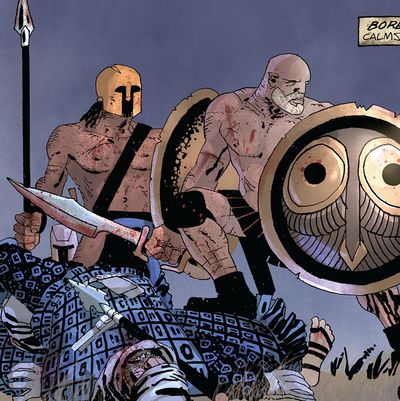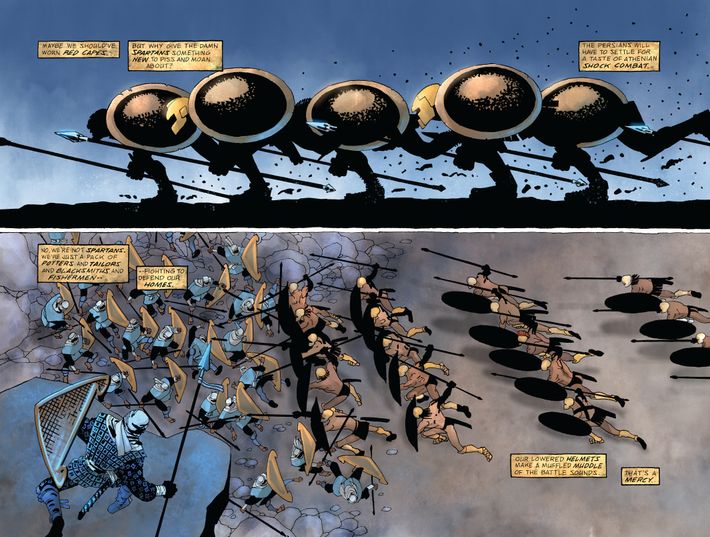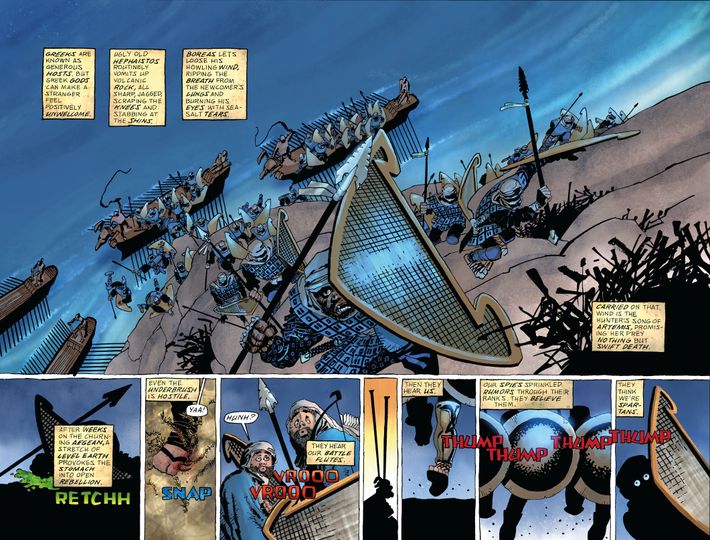
Comics icon Frank Miller could have retired in comfort and acclaim decades ago, but like the Spartans at Thermopylae, he refuses to give in. The writer and artist has had a truly remarkable career, having crafted one masterwork after another: Batman: The Dark Knight Returns, Daredevil: Born Again, and Sin City, just to name a few. But the master of comic-book violence was never more forceful than in his 1998 historical graphic novel 300, which told the story of a group of Spartan warriors who held off the hordes of Persia in a suicide mission that altered the course of civilization. Following a successful film adaptation, a less-successful film sequel, and years of delays, Miller has returned to the world of 300 with a spinoff series called Xerxes: The Fall of the House of Darius and the Rise of Alexander. It chronicles the travails of the titular figures but, as he told Vulture, not in the way you might expect.
So, people are a little confused about the title, since Alexander the Great wasn’t contemporaneous with Xerxes. Are we going to see travel through time?
No, no. The story goes beyond the life of Xerxes. The piece I’m working on right now deals with his heir, Darius. The overarching theme of this is the rise and fall of the Persian Empire and the rise of Alexander. So, it’s kind of a big book.
Yeah, that’s a lot to cover in just a few issues. What’s interesting to you about the Persian Empire?
Well, everything from the Persian Empire and the Greek Empire is a real study in how the course of the world — of civilizations and the power therein — could be changed so radically. Everything that’s come since then was forged by these wars. We’d be living very differently if Alexander hadn’t come along. To me, the largest issue is the concept of civilization itself, and the clash between Western and Eastern points of view, which has been ongoing ever since. It’s still playing a role.
How long has this been in the works? It’s been a while since you’ve visited the 300 universe.
Oh, it’s been in the works forever. Much interrupted. It’s great to be back on it. It was interrupted for years. A lot of that was research, a lot of that was life. But it’s formed together now.
What, exactly, was its relationship with the second 300 movie, Rise of an Empire? Did you give them an early script of the comic or something?
Sure, yeah. But I’ve been carrying along on my own book. My book is, obviously … A comic book, like a novel, can go much further and longer. This is a much longer view on the whole subject.

What lessons do you think we can learn from looking at the rise and fall of the Persian Empire?
I don’t think of it as lessons, per se. More as an instruction of who we are and where we came from. Because the same forces that fought in such primal ways back then are in play … Much of what’s going on, particularly with the Middle East and the Eastern-Western conflicts that persist, is rooted in those eras. The same issues do exist. And Alexander is a wonderful figure — he was a Macedonian Greek who did conquer the world, did conquer Persia and all that, but became quite Persian himself in the end. He brought both cultures together as much as he conquered one.
So this series isn’t a diss of the Persians, but more a story about how civilizations contribute to one another?
That is the nature of most conquering, that the conquered civilization is absorbed. People are very resilient and cultures are very persistent. You couldn’t simply crush all the beauty of the Persian culture as if it never existed.
On a technical level, why is it that 300 and Xerxes are laid out horizontally instead of vertically?
The horizontal reason is very practical: These were all decided by land battles, and land battles are essentially a horizontal activity. Beyond that, they involve large groups of people in action, and the horizontal format gives all of the basic movements of the characters. It just gives things a grander sweep. If you think about it, when you’re taking in a vista, if you’re looking at new territory or enjoying a view, your eyes move from side to side, not up and down.
You mention land wars, but the first issue of Xerxes also features a sea battle.
Boy, is that hard. But it’s really worth doing. The battles at sea are also chopping across waves, and to put it bluntly, water is really hard to draw.
Did you go back and reread 300 in preparation for Xerxes? I know a lot of creators don’t like looking at their old work.
Oh, I have to refer to it. I’m very, very proud of 300. I look at it and I don’t think, Well, what would I do differently? I simply accept it as what it is. It was very much a product of the time I did it, but it was the best story I ever had my hands on, and I did my very best by it.
What do you mean by it being a product of its time?
I mean, it was a product of my entire life. I’ve loved the story ever since I saw The 300 Spartans, starring Richard Egan, when I was a young kid in the ’60s, and I researched it as thoroughly as I could. It’s as pure a story of heroism as I could find. Our version would probably be the Alamo, in terms of the overwhelming size of the enemy.
What did you think of Zack Snyder’s 300 movie and the sequel?
I thoroughly loved the 300 movie. It was just absolutely wonderful.

Something that always struck me about the movie is how Snyder changed the bit where the Persian messenger says, “This is madness,” and Leonidas replies, “This is Sparta,” from a quiet one-liner to a thing that Leonidas just screams. It’s a small thing, but what did you think of that change?
Oh, it was brilliant. I think it worked beautifully.
Xerxes, so far, focuses on Athenians, not Spartans. What makes them interesting in ways that the Spartans aren’t?
I’ll try to answer this in less than half an hour. The difference is, the Spartans were the oldest of the Greeks and they very much represented the old ways of the world. Whereas the Athenians were new, far-reaching, future-oriented. Basically, the Spartans were a bunch of farmers who learned to fight wars to defend their farming territory, while the Athenians were the philosophers and the teachers and the writers and artists. But the role of the Spartans in history is both pivotal and fascinating.
But the Athenians can hold their own in the battlefield. Honestly, in junior high, I mostly just learned about them as paragons of democracy and culture.
They were brilliant in battle and they were a culture that succeeded on every level. The Spartans, essentially, became so culturally paranoid that they kind of ceased to exist because they didn’t read. They built for war while the Athenians built for progress. What we have from the Greeks is basically Athenian: the art, the learning, the culture, the sense of democracy.
A warrior named Aeskylos shows up and there’s mention of him being a dramatist. Is that supposed to be Aeschylus, as in the great Greek playwright?
Aeschylus was actually an Athenian warrior. He was a great warrior-playwright. The term that we use to refer to the Athenians is “citizen-soldiers.” You were either a citizen-soldier or you were a slave, in that era.
That was news to me. He’s sort of an Athenian ninja in this, leaping around and cutting dudes in half.
[Laughs.] Well, I had to make up my own version. I just thought it’d be cool. I want a T-shirt right now.
Saying what?
“Athenian ninja.”

